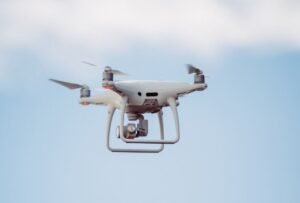AI and Security
Artificial Intelligence (AI) is revolutionizing various industries, and the field of security is no exception. With the increasing complexity and sophistication of cyber threats, AI has emerged as a powerful tool for enhancing security measures and protecting sensitive information. This article explores the intersection of AI and security, discussing various applications, benefits, and challenges associated with the integration of these technologies.
Key Takeaways
- AI is transforming the field of security by enhancing threat detection and response capabilities.
- Integration of AI algorithms with security systems improves accuracy and reduces false positives.
- AI can be leveraged to automate routine security tasks, freeing up human resources for more critical activities.
- Despite its advantages, AI-powered security solutions raise concerns related to data privacy and ethical implications.
Applications of AI in Security
AI offers various applications that strengthen security measures and provide proactive threat detection.
- Advanced Threat Detection: AI algorithms can analyze large volumes of data to identify patterns and anomalies associated with potential security breaches, enhancing threat detection capabilities.
- Behavioral Analytics: AI-powered systems can learn and analyze user behavior, enabling the identification of unusual activities or unauthorized access attempts.
- Security Automation: AI can automate routine security tasks such as monitoring network traffic, managing access control, and analyzing logs.
- Malware Detection: AI algorithms can continuously learn and adapt to new malware patterns, enabling more effective detection and mitigation of malicious software.
The Benefits of AI in Security
Integrating AI with security systems provides numerous advantages for organizations and individuals.
- Increased Accuracy: AI algorithms can analyze vast amounts of data with high accuracy, reducing false positives and improving overall threat detection efficiency.
- Faster Response Times: AI-powered systems can quickly identify and respond to security incidents, minimizing the potential damage caused by cyber threats.
- Improved Efficiency: Automation of security tasks by AI frees up human resources, allowing security professionals to focus on more complex and critical aspects of their work.
- Continuous Learning: AI algorithms have the ability to continuously learn from new data, improving their detection capabilities over time.
Challenges and Concerns
While AI brings significant benefits to the field of security, it also raises various challenges and concerns.
- Data Privacy: AI systems require access to large amounts of data, raising concerns about the privacy and security of collected information.
- Ethical Implications: AI-powered security systems may raise ethical questions, such as biased decision-making or the use of personal data without consent.
- Adversarial Attacks: AI algorithms can be targeted by cybercriminals who try to manipulate or deceive the system to evade detection.
Data Breach Statistics
| Year | Number of Data Breaches | Number of Records Exposed |
|---|---|---|
| 2017 | 1,579 | 178 million |
| 2018 | 1,244 | 446 million |
| 2019 | 1,473 | 164 million |
**In 2018, the number of data breaches decreased compared to the previous year, but the number of records exposed increased significantly.
The Future of AI and Security
AI is set to play an increasingly vital role in enhancing security measures and protecting against cyber threats.
- Continued Integration: AI will become an integral part of security systems, improving threat detection, response times, and overall resilience.
- Advancements in Machine Learning: As machine learning algorithms evolve, AI-powered security systems will grow more sophisticated, adapting to new and ever-changing threats.
- Collaboration: Cooperation between AI developers, security experts, and policymakers will be crucial in addressing the challenges and ethical considerations associated with AI and security.
Cybersecurity Spending Forecast
| Year | Global Cybersecurity Spending (USD billions) |
|---|---|
| 2019 | 106.6 |
| 2020 | 120.7 |
| 2021 | 133.7 |
*Global cybersecurity spending is projected to continue growing, demonstrating the increasing recognition of the importance of AI-powered security solutions.

Common Misconceptions
AI and Security
There are several common misconceptions that people have regarding the relationship between AI and security:
- AI can completely replace human security professionals
- AI is infallible, with no vulnerabilities
- All AI systems are created equal
One common misconception is that AI can completely replace human security professionals. While AI technology has made significant advancements in its ability to detect and mitigate security threats, it is still far from being a complete substitute for human expertise. Human security professionals possess critical thinking and a deep understanding of context that AI may struggle to replicate. AI can serve as a valuable tool in augmenting human security professionals, but it cannot entirely replace them.
- AI can support security professionals but not completely replace them
- Human expertise is essential for context and decision-making in security
- AI and human collaboration can enhance overall security measures
Another misconception is that AI is infallible and has no vulnerabilities. While AI systems are designed to be highly robust, they are not immune to vulnerabilities. AI algorithms can be targeted and manipulated, leading to potential security breaches. To ensure the security of AI systems, it is crucial to implement rigorous testing, monitoring, and continual updates. Additionally, human oversight is essential to detect and address any unforeseen vulnerabilities or adversarial attacks.
- AI systems are robust but not invulnerable to attacks
- Rigorous testing and monitoring are necessary to ensure AI security
- Human oversight is essential to identify and address vulnerabilities
A third misconception is that all AI systems are created equal. AI systems vary in their capabilities and levels of security. While some AI systems may have advanced security measures in place, others may have vulnerabilities that can be exploited. It is essential to thoroughly evaluate and choose AI systems based on their security features, including encryption, authentication mechanisms, and regular updates. By selecting reliable and secure AI systems, organizations can avoid potential security risks.
- Not all AI systems have the same level of security
- Security features such as encryption and authentication vary across AI systems
- Organizations should carefully evaluate and select AI systems based on their security capabilities
In conclusion, it is important to dispel these common misconceptions surrounding AI and security. While AI technology has immense potential to enhance security measures, it is crucial to recognize that it cannot replace human security professionals entirely. Furthermore, AI systems are not infallible and can have vulnerabilities that need to be diligently addressed. Lastly, not all AI systems are created equal, and organizations must carefully evaluate and choose AI systems based on their security capabilities. Through a balanced approach that combines human expertise and technological advancements, organizations can effectively leverage AI to strengthen their security defenses.

1. AI Adoption in Security
According to a recent study, the adoption of artificial intelligence (AI) in security systems has shown a significant increase. This table presents the percentage of organizations that have incorporated AI-based solutions into their security systems.
| Year | Percentage of Organizations |
|---|---|
| 2016 | 27% |
| 2017 | 39% |
| 2018 | 54% |
| 2019 | 68% |
2. Types of AI-powered Security Applications
There are various types of security applications powered by AI technology. This table provides an overview of the different AI-driven security applications and their use cases.
| AI Security Application | Use Case |
|---|---|
| Behavioral Analytics | Identifies anomalies and suspicious patterns |
| Deep Learning | Enhances pattern recognition and threat detection |
| Natural Language Processing | Assists in analyzing and categorizing unstructured data |
| Machine Learning | Improves threat intelligence and incident response |
3. Impact of AI on Cybersecurity Operations
AI technologies have revolutionized cybersecurity operations. This table illustrates the impact of AI on various aspects of cybersecurity.
| Cybersecurity Aspect | AI Impact |
|---|---|
| Threat Detection | Reduces false positives and improves accuracy |
| Malware Analysis | Identifies and analyzes new and unknown threats |
| User Authentication | Enhances identity verification and access control |
| Data Privacy | Protects sensitive information through advanced encryption |
4. AI in Surveillance Systems
AI has played a crucial role in enhancing surveillance systems‘ capabilities. This table showcases the improvements brought by AI in surveillance.
| Surveillance Enhancement | AI Contribution |
|---|---|
| Object Recognition | Accurately detects and tracks objects in real-time |
| Facial Recognition | Identifies individuals and enhances security monitoring |
| Behavior Analysis | Detects suspicious behavior and potential threats |
| Smart Alerts | Prioritizes alerts based on perceived threat level |
5. AI in Network Security
AI has proven to be highly valuable in improving network security. This table displays the different applications of AI in network security.
| AI Network Security Application | Function |
|---|---|
| Anomaly Detection | Identifies abnormal network behavior and potential attacks |
| Intrusion Detection | Detects and prevents unauthorized access to the network |
| Vulnerability Assessment | Identifies weaknesses and potential entry points |
| Dynamic Firewall Management | Optimizes firewall rules based on network traffic patterns |
6. AI-based Threat Intelligence
AI has significantly advanced the field of threat intelligence. This table highlights the benefits of AI in threat intelligence processes.
| AI Benefit | Description |
|---|---|
| Faster Threat Discovery | Enables quick identification and analysis of new threats |
| Enhanced Threat Hunting | Improves the efficiency and accuracy of threat hunting activities |
| Automated Incident Response | Enables immediate response to security incidents |
| Situational Awareness | Provides real-time understanding of the threat landscape |
7. Integration of AI and Biometric Systems
The integration of AI and biometric systems has strengthened security measures. This table showcases the advantages of combining AI with biometrics.
| Advantage | Explanation |
|---|---|
| High Accuracy | Improved identification and verification accuracy |
| Non-Repudiation | Ensures secure and non-falsifiable identification |
| Fast Identification | Efficient and rapid identification process |
| Enhanced Security | Combines multiple factors for robust security measures |
8. AI in Malware Detection
The use of AI in malware detection has greatly improved security practices. This table presents the advantages of employing AI in malware detection.
| Advantage | Description |
|---|---|
| Zero-Day Threat Detection | Identifies previously unknown threats in real-time |
| Behavioral Analysis | Examines software behavior to detect malicious intent |
| Reduced False Positives | Decreases the number of false alarms and alerts |
| Automated Response | Enables swift identification and isolation of malware |
9. AI-powered User Access Control
AI has introduced more sophisticated user access control methods. This table demonstrates the features AI brings to user access control systems.
| AI Feature | Description |
|---|---|
| Contextual Identity Verification | Analyzes behavior patterns for identity verification |
| User Behavior Analytics | Detects anomalies indicating potential unauthorized access |
| Continuous Authentication | Periodically verifies the user’s identity during a session |
| Dynamic Access Provisioning | Adjusts access levels based on the current security context |
10. AI-enabled Security Automation
AI has driven significant advancements in security automation. This table outlines the benefits of AI-powered security automation.
| Benefit | Description |
|---|---|
| Efficiency | Automates time-consuming security tasks for increased efficiency |
| Scalability | Allows handling of large volumes of security-related data |
| Reduced Human Error | Minimizes errors through automated processes |
| Proactive Threat Hunting | Enables the proactive identification and prevention of threats |
In today’s rapidly evolving digital landscape, the intertwining of AI and security is revolutionizing how organizations protect their digital assets. This article delved into the various aspects of AI and security, from the adoption of AI in security systems to its impact on different domains such as cyber-operations, surveillance, network security, and more. The integration of AI in these areas has brought forth numerous advantages, ranging from enhanced threat detection to improved user access control and security automation. As the deployment of AI continues to grow, its role in safeguarding the digital realm will undoubtedly become even more critical. Organizations must embrace AI-driven security solutions to stay one step ahead of sophisticated threats, ensuring the safety and integrity of their systems and data.
AI and Security – Frequently Asked Questions
FAQs
How does artificial intelligence (AI) impact security?
Artificial intelligence has a significant impact on security, both positive and negative. It can enhance security measures by automating threat detection, analyzing large amounts of data for anomalies, and implementing proactive defense mechanisms. However, AI can also be exploited by cybercriminals to develop sophisticated attacks or deepfakes that can deceive traditional security systems.
What are the major concerns regarding AI and security?
Some major concerns related to AI and security include privacy breaches, data manipulation or theft, algorithmic bias, unauthorized access to AI systems, and AI-enabled social engineering attacks. These issues require careful consideration and robust security measures to mitigate the risks associated with AI technology.
How can AI be used to improve security?
AI can be utilized to improve security in various ways. It can help in real-time threat detection, anomaly detection, predictive analysis, malware detection, and identifying patterns in large datasets. Additionally, AI can automate security tasks, such as monitoring network traffic, enhancing user authentication systems, and providing intelligent automated responses to incidents.
What is the role of AI in cybersecurity defenses?
AI plays a crucial role in cybersecurity defenses. It can strengthen defenses by continuously monitoring and analyzing vast amounts of data to detect abnormal behaviors or potential threats. AI algorithms can identify new attack patterns, adapt to evolving threats, and enable faster response times. This helps in mitigating security risks and reducing the impact of cyber attacks.
Can AI be used to attack security systems?
Yes, AI can be used to attack security systems. Cybercriminals can leverage AI techniques to develop advanced malware, exploit vulnerabilities, create realistic phishing emails or websites, and bypass traditional security measures. This necessitates the development of AI-powered defensive systems to counteract these malicious AI-driven attacks.
What is the importance of AI in identity verification?
AI can be highly valuable in identity verification processes. It enables more accurate identification by analyzing and comparing various factors, such as facial recognition, voice patterns, biometrics, and behavioral analysis. AI-based identity verification systems offer enhanced security, reduce the chances of identity theft, and provide a seamless user experience for authentication purposes.
How can AI contribute to data protection?
AI contributes to data protection by assisting in the identification and classification of sensitive data, monitoring access controls, detecting unauthorized activities, and alerting security teams in case of potential data breaches. AI algorithms can also help in data encryption, metadata analysis, and anomaly detection to ensure robust data protection practices.
What are the ethical considerations related to AI and security?
Ethical considerations related to AI and security include issues of privacy, transparency, bias, accountability, and ensuring AI systems do not infringe upon human rights. There is a need for ethical guidelines and governance frameworks to address these concerns and ensure AI technology is developed and used responsibly in the context of security.
What is the future of AI and security?
The future of AI and security holds great potential. AI will continue to evolve and play a critical role in strengthening security mechanisms. However, it will also require constant advancement and adaptation to counter emerging AI-driven threats. The collaboration between human expertise and AI technology will shape a more secure digital landscape.
How can organizations integrate AI into their security strategies?
Organizations can integrate AI into their security strategies by leveraging AI-enabled security solutions, such as next-generation firewalls, SIEM systems, intrusion detection systems, and user behavior analytics. Implementing machine learning algorithms and employing data scientists can also assist in developing AI-driven security systems tailored to the specific needs of an organization.




